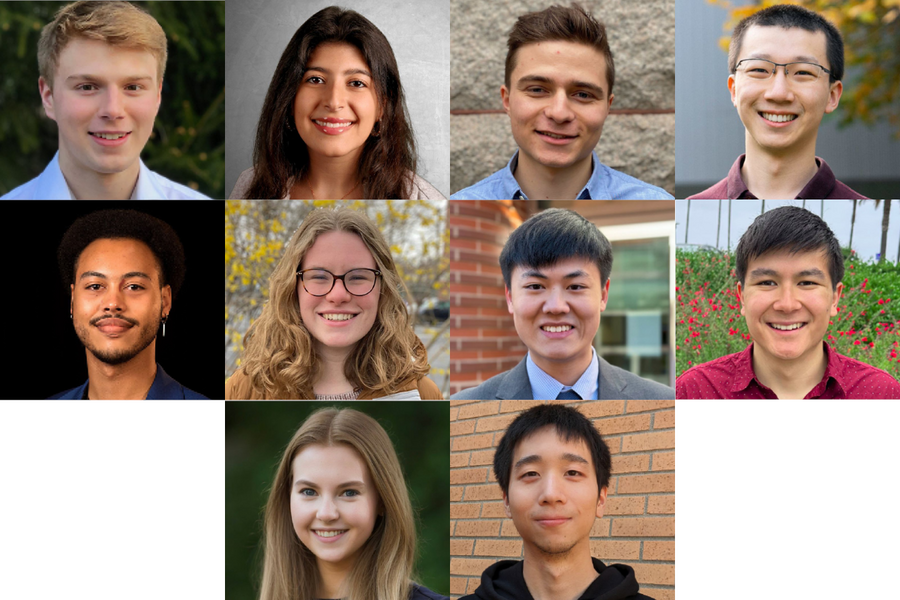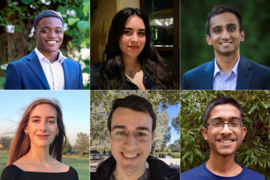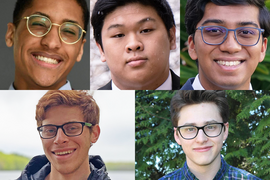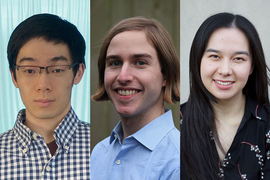The Fannie and John Hertz Foundation announced that it has awarded fellowships to 10 PhD students with ties to MIT. The prestigious award provides each recipient with five years of doctoral-level research funding (up to a total of $250,000), which allows them the flexibility and autonomy to pursue their own innovative ideas.
Fellows also receive lifelong access to Hertz Foundation programs, such as events, mentoring, and networking. They join the ranks of over 1,300 former Hertz Fellows who are leaders and scholars in a range of fields in science, engineering, and technology. Connections among fellows over the years have sparked collaborations in startups, research, and technology commercialization.
The 10 MIT recipients are among a total of 18 Hertz Foundation Fellows scholars selected this year from across the country. Five of them received their undergraduate degrees at the Institute and will pursue their PhDs at other schools. Two are current MIT graduate students, and four will begin their studies here in the fall.
“For more than 60 years, Hertz Fellows have led scientific and technical innovation in national security, applied biological sciences, materials research, artificial intelligence, space exploration, and more. Their contributions have been essential in advancing U.S. competitiveness,” says Stephen Fantone, chair of the Hertz Foundation board of directors and founder and president of Optikos Corp. “I’m excited to watch our newest Hertz Fellows as they pursue challenging research and continue the strong tradition of applying their work for the greater good.”
This year’s MIT-affiliated awardees are:
Owen Dugan ’24 graduated from MIT in just two-and-a-half years with a degree in physics, and he plans to pursue a PhD in computer science at Stanford University. His research interests lie at the intersection of AI and physics. As an undergraduate, he conducted research in a broad range of areas, including using physics concepts to enhance the speed of large language models and developing machine learning algorithms that automatically discover scientific theories. He was recognized with MIT’s Outstanding Undergraduate Research Award and is a U.S. Presidential Scholar, a Neo Scholar, and a Knight-Hennessy Scholar. Dugan holds multiple patents, co-developed an app to reduce food waste, and co-founded a startup that builds tools to verify the authenticity of digital images.
Kaylie Hausknecht will begin her physics doctorate at MIT in the fall, having completing her undergraduate degree in physics and astrophysics at Harvard University. While there, her undergraduate research focused on developing new machine learning techniques to solve problems in a range of fields, such as fluid dynamics, astrophysics, and condensed matter physics. She received the Hoopes Prize for her senior thesis, was inducted into Phi Beta Kappa as a junior, and won two major writing awards. In addition, she completed five NASA internships. As an intern, she helped identify 301 new exoplanets using archival data from the Kepler Space Telescope. Hausknecht served as the co-president of Harvard’s chapter of Science Club for Girls, which works to encourage girls from underrepresented backgrounds to pursue STEM.
Elijah Lew-Smith majored in physics at Brown University and plans to pursue a doctoral degree in physics at MIT. He is a theoretical physicist with broad intellectual interests in effective field theory (EFT), which is the study of systems with many interacting degrees of freedom. EFT reveals how to extract the relevant, long-distance behavior from complicated microscopic rules. In 2023, he received a national award to work on applying EFT systematically to non-equilibrium and active systems such as fluctuating hydrodynamics or flocking birds. In addition, Lew-Smith received a scholarship from the U.S. State Department to live for a year in Dakar, Senegal, and later studied at ’École Polytechnique in Paris, France.
Rupert Li ’24 earned his bachelor’s and master’s degrees at MIT in mathematics as well as computer science, data science, and economics, with a minor in business analytics.He was named a 2024 Marshall Scholar and will study abroad for a year at Cambridge University before matriculating at Stanford University for a mathematics doctorate. As an undergraduate, Li authored 12 math research articles, primarily in combinatorics, but also including discrete geometry, probability, and harmonic analysis. He was recognized for his work with a Barry Goldwater Scholarship and an honorable mention for the Morgan Prize, one of the highest undergraduate honors in mathematics.
Amani Maina-Kilaas is a first-year doctoral student at MIT in the Department of Brain and Cognitive Sciences, where he studies computational psycholinguistics. In particular, he is interested in using artificial intelligence as a scientific tool to study how the mind works, and using what we know about the mind to develop more cognitively realistic models. Maina-Kilaas earned his bachelor’s degree in computer science and mathematics from Harvey Mudd College. There, he conducted research regarding intention perception and theoretical machine learning, earning the Astronaut Scholarship and Computing Research Association’s Outstanding Undergraduate Researcher Award.
Zoë Marschner ’23 is a doctoral student at Carnegie Mellon University working on geometry processing, a subfield of computer graphics focused on how to represent and work with geometric data digitally; in her research, she aims to make these representations capable of enabling fundamentally better algorithms for solving geometric problems across science and engineering. As an undergraduate at MIT, she earned a bachelor’s degree in computer science and math and pursued research in geometry processing, including repairing hexahedral meshes and detecting intersections between high-order surfaces. She also interned at Walt Disney Animation Studios, where she worked on collision detection algorithms for simulation. Marschner is a recipient of the National Science Foundation’s Graduate Research Fellowship and the Goldwater Scholarship.
Zijian (William) Niu will start a doctoral program in computational and systems biology at MIT in the fall. He has a particular interest in developing new methods for imaging proteins and other biomolecules in their native cellular environments and using those data to build computational models for predicting their dynamics and molecular interactions. Niu received his bachelor’s degree in biochemistry, biophysics, and physics from the University of Pennsylvania. His undergraduate research involved developing novel computational methods for biological image analysis. He was awarded the Barry M. Goldwater Scholarship for creating a deep-learning algorithm for accurately detecting tiny diffraction-limited spots in fluorescence microscopy images that outperformed existing methods in quantifying spatial transcriptomics data.
James Roney received his bachelor’s and master’s degrees from Harvard University in computer science and statistics, respectively. He is currently working as a machine learning research engineer at D.E. Shaw Research. His past research has focused on interpreting the internal workings of AlphaFold and modeling cancer evolution. Roney plans to pursue a PhD in computational biology at MIT, with a specific interest in developing computational models of protein structure, function, and evolution and using those models to engineer novel proteins for applications in biotechnology.
Anna Sappington ’19 is a student in the Harvard University-MIT MD-PhD Program, currently in the first year of her doctoral program at MIT in electrical engineering and computer science. She is interested in building methods to predict evolutionary events, especially connections among machine learning, biology, and chemistry to develop reinforcement learning models inspired by evolutionary biology. Sappington graduated from MIT with a bachelor’s degree in computer science and molecular biology. As an undergraduate, she was awarded a 2018 Barry M. Goldwater Scholarship and selected as a Burchard Scholar and an Amgen Scholar. After graduating, she earned a master’s degree in genomic medicine from the University of Cambridge, where she studied as a Marshall Scholar, as well as a master’s degree in machine learning from University College London.
Jason Yang ’22 received his bachelor’s degree in biology with a minor in computer science from MIT and is currently a doctoral student in genetics at Stanford University. He is interested in understanding the biological processes that underlie human health and disease. At MIT, and subsequently at Massachusetts General Hospital, Yang worked on the mechanisms involved in neurodegeneration in repeat expansion diseases, uncovering a novel molecular consequence of repeat protein aggregation.









